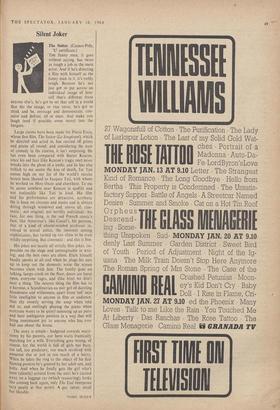Silent Joker
The Suitor. (Cameo-Poly, `1.3' certificate.) Large claims have been made for Pierre Etaix, whose first film, The Suitor (Le Soupirant), which he directed and acted in, has carried off prizes and praise all round; and considering the state of comedy in the cinema, it isn't surprising. He has even been compared with Buster Keaton, since his sad face (like Keaton's tragic one) never breaks into the ghost of a smile; and he has also (which to me seems the kiss of death, for Tati comes high on my list of the world's outsize bores) been likened to Jacques Tati, with whom he worked on Mon Oncle and elsewhere. To me he seems nowhere near Keaton in, quality and not noticeably like Tati in kind. His film and his performance are attractive, acrobatic (he is keen on circuses and stunts and is always diving through windows) and, above all, cine- matic: not original, not terribly individual—his face, for one thing, is the sad French comic's face, like Aznavour's, like Cassel's, his persona, that of a kind of absent-minded professor in- volved in sexual antics, the innocent among sophisticates, has turned up too often to be even mildly surprising. But cinematic: and this is fine.
His jokes are nearly all strictly film jokes, im- possible on the stage and unimaginable in writ- ing; and the best ones are silent. Etaix himself hardly speaks at all and when he plugs his ears up to keep out the domestic noise the screen becomes silent with him. The family .goes on talking, lamps. clash on the floor, doors are burst open, everyone rages, and (like him) we don't hear a thing. The nearest thing the film has to a heroine, a Scandinavian au pair girl of dazzling blondeness and witlessness, apart from 'tak' says little intelligible to anyone in film or audience, thus (by sweetly serving the soup when told not to, and smilingly playing the piano when everyone wants to be quiet) summing up an pairs and their ambiguous position in a way that will bring reminiscent joy to anyone who has ever had one about the house.
The story is simple: badgered towards matri- mony by his parents, our hero starts frantically searching for a wife. Everything goes wrong, of course, for the world is full of girls too busy, too tall, too predatory, too much involved with someone else or just in too much of a hurry. When he takes the ring to the object of his first flaming passion he's greeted by her adult son, and bolts. And when he finally gets the girl who's been (silently) around from the start he's carried away on a luggage car (which reassuringly looks like coming back again, only The End interposes very neatly at that point). A gay talent; small but likeable.
ISABEL QI:BiLY


































 Previous page
Previous page